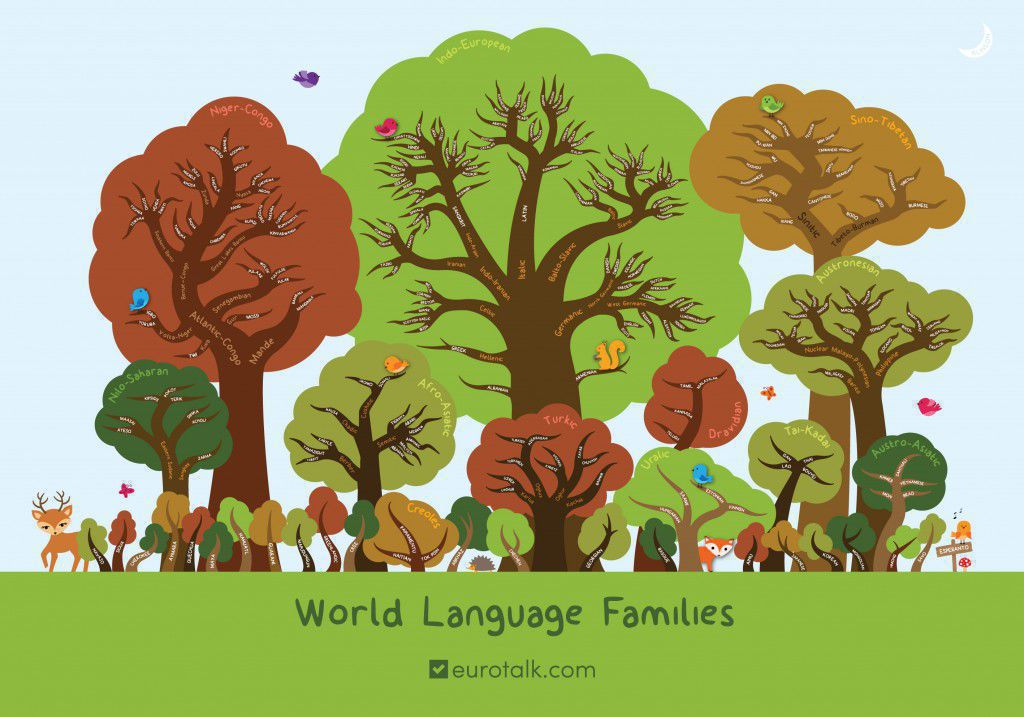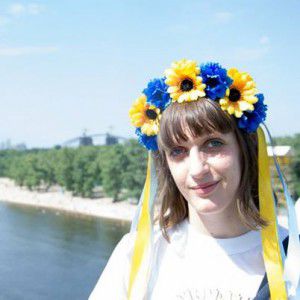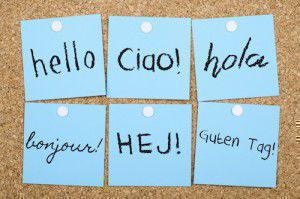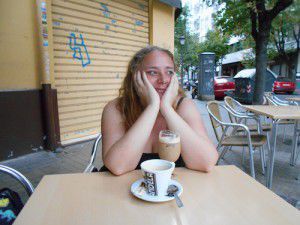The Language Forest: how are world languages related?
Have you ever wondered how different languages in the world are related to each other? Some of the answers may be surprising…
Did you know, for example, that the Finnish language isn’t directly related to Danish or Norwegian? It’s actually a Uralic language, in the same family as Hungarian and Estonian, whereas the others are North Germanic.
Or that Korean and Basque are two examples of a language isolate, which means they’re not related to any other language in the world?
According to Ethnologue, the Indo-European language family has the most speakers (2.9m), although the Niger-Congo family includes the most languages (1,524).
To find out more, check out our forest of language family trees below. Please click on the image to make it bigger and have a good look around; you may well discover languages you never knew existed…
(Please note: the forest doesn’t include every language in the world; it would have been difficult to fit all 6,000+ in! So if we’ve missed off your language, we’re really sorry and hope you’ll forgive us.)
 If you’d like to share the image on your own blog or website, you’re more than welcome – please use the embed code below. We also include a free poster-sized copy of the language forest with all our CD-ROM and USB products (available from eurotalk.com), with a world language map on the reverse.
If you’d like to share the image on your own blog or website, you’re more than welcome – please use the embed code below. We also include a free poster-sized copy of the language forest with all our CD-ROM and USB products (available from eurotalk.com), with a world language map on the reverse.
We hope you enjoy exploring the language forest 🙂
Embed This Image On Your Site (copy code below):
Travels with a language geek
After almost three years as an (unofficial, for the last year) member of the EuroTalk family, I’ve finally decided that it’s time for me to move on and take my passion for languages and cultures on the road. So, I’m hanging up my localisation project manager hat (not literally of course – there’s no designated hat for that) and setting off on a trip across Europe.
 I have to say that at the moment my plans are pretty vague. My partner has a car, so we’re packing our stuff in the boot, getting in and heading off for a mega road trip across Europe: the Netherlands, Germany, the Czech Republic, Poland and Ukraine, for a start. Then the idea is to end up in Lviv, Western Ukraine and stick around there for a while until we decide the next phase of our plan. There’s no particular time-scale on any of this – we’re simply going to drive from city to city, visit a few friends, see some sights and move on when we feel like it. The only limit on how much time we can spend driving from place to place is money, and how long we can stand spending that much time together. When we finally get to Lviv, we’re planning to rent a flat there for a while and live the digital nomad lifestyle, experiencing life in Ukraine and using Lviv as a base from which to explore other parts of Eastern Europe.
I have to say that at the moment my plans are pretty vague. My partner has a car, so we’re packing our stuff in the boot, getting in and heading off for a mega road trip across Europe: the Netherlands, Germany, the Czech Republic, Poland and Ukraine, for a start. Then the idea is to end up in Lviv, Western Ukraine and stick around there for a while until we decide the next phase of our plan. There’s no particular time-scale on any of this – we’re simply going to drive from city to city, visit a few friends, see some sights and move on when we feel like it. The only limit on how much time we can spend driving from place to place is money, and how long we can stand spending that much time together. When we finally get to Lviv, we’re planning to rent a flat there for a while and live the digital nomad lifestyle, experiencing life in Ukraine and using Lviv as a base from which to explore other parts of Eastern Europe.
You might wonder why of all places I’ve chosen to go and live in Ukraine. Well, I wish I could give you a really great and well-thought out reason, but the simple fact is: it’s really cheap to live there right now! According to NomadList.com, you can live in Lviv on $400 a month. That’s around £250 – less than half of what I pay each month in rent here in London. Which is pretty appealing to someone who is trying to live as a digital nomad for the foreseeable future. For those of you who don’t spend as much time as I do stalking travel bloggers on Twitter, a digital nomad is someone who lives abroad and/or travels indefinitely, funding themselves by working remotely via wifi and their laptop. A few intrepid travellers out there have managed to fund themselves all the way around the world just by blogging, writing or completing other online work. In my case I’ll be translating to earn my daily bread, whilst pretending to be a super-cool international travel blogger the rest of the time. It’s all about wearing expensive sunglasses and taking selfies, I’m assured.
But taking advantage of 30p beers isn’t the only reason I’m excited to experience life in Eastern Europe. As a language geek, of course I can’t wait to try my hand at picking up Russian and bits of other local languages: Polish, Ukrainian and Czech sounds like a start! Not to mention finding out as much as I can about the culture, lifestyle and places of this amazing region. Oh, and I’ll be bombarding everyone with updates and photos via my brand-new blog: postcardsfromukraine.com, which is already in the top ten blogs about being a digital nomad in Ukraine written by a Brit and an Italian. So, if you’re curious, feel free to catch up with us on Twitter @ukrpostcards or the Postcards from Ukraine Facebook page, and I promise to keep EuroTalk updated on my language-learning goals too.
Alex
Are you ever too old to learn a language?
As a small child, I was practically a real-life Harry Potter. Without the magic. Or the mean Aunt and Uncle. Okay, well really, the only similarity is that I spent a lot of my days in the cupboard under the stairs. Now, before you call the authorities, don’t worry. It was my favourite place! I had a comfy chair and my own TV and all the VHS tapes of awful 90s cartoons that a toddler could ever ask for!
 Why is this relevant to EuroTalk I hear you ask?! Well, it was here, sat watching Tots TV, that I accidentally taught myself French! My parents had no idea, until one day I casually said to my Mum ‘Bonjour, Je m’appelle Codie! That means “Hello, my name is Codie”, Mummy!’. She was in shock. After all, what would you think if your three year old daughter started spouting French? Once I’d explained that I got it from Tilly (sorry to anyone born too early/late to understand the references here, YouTube it!), I was inundated with French books, tapes and excited relatives. Even the nurse at our local GP practice heard about my weird knowledge and insisted on making me count to ten in French whilst she gave me my injections. I was essentially a performing monkey – but I loved it!
Why is this relevant to EuroTalk I hear you ask?! Well, it was here, sat watching Tots TV, that I accidentally taught myself French! My parents had no idea, until one day I casually said to my Mum ‘Bonjour, Je m’appelle Codie! That means “Hello, my name is Codie”, Mummy!’. She was in shock. After all, what would you think if your three year old daughter started spouting French? Once I’d explained that I got it from Tilly (sorry to anyone born too early/late to understand the references here, YouTube it!), I was inundated with French books, tapes and excited relatives. Even the nurse at our local GP practice heard about my weird knowledge and insisted on making me count to ten in French whilst she gave me my injections. I was essentially a performing monkey – but I loved it!
Fast-forward a few years later and I’m in the second half of Primary School. We have a super cool substitute teacher who plays guitar and teaches us German. It takes him less than half an hour to teach an entire class of children to count to ten in German and 15 or so years later I still know it.
Fast-forward a few years even later and my adorable four year old nephew is counting to ten in Japanese! Something they learn at pre-school through the use of cute mnemonic devices (with even cuter actions!). Languages are being taught younger and younger and suddenly, my toddler French seems a whole lot less impressive.
 So that leads me to wonder, am I too old to learn a language? I’m led to believe that the older you are, the harder it is to learn an instrument (well, at least I can sort of play the recorder, right?), so does this apply for other skills? I can’t do a cartwheel, so I figure that boat has sailed, but I did recently learn how to knit… badly. Do different things have different cut off points? As knitting is usually for old ladies, was I only able to learn it because I’m cracking on a bit now? (Maybe a slight exaggeration, I am only 23 after all.) Most importantly am I the right age to finally start learning a language? As I’m currently childless, I know it’s my biological clock I should be worried about, but I genuinely think it is being drowned out by the voice in my head that is yelling ‘What happened to the girl who was learning French before she could tie her shoes? What are you doing with your life?!’.
So that leads me to wonder, am I too old to learn a language? I’m led to believe that the older you are, the harder it is to learn an instrument (well, at least I can sort of play the recorder, right?), so does this apply for other skills? I can’t do a cartwheel, so I figure that boat has sailed, but I did recently learn how to knit… badly. Do different things have different cut off points? As knitting is usually for old ladies, was I only able to learn it because I’m cracking on a bit now? (Maybe a slight exaggeration, I am only 23 after all.) Most importantly am I the right age to finally start learning a language? As I’m currently childless, I know it’s my biological clock I should be worried about, but I genuinely think it is being drowned out by the voice in my head that is yelling ‘What happened to the girl who was learning French before she could tie her shoes? What are you doing with your life?!’.
And that, my friends, is the existential crisis that has inspired me to try and learn Japanese, with the help of EuroTalk. Maybe I’ll shut myself in the cupboard under the stairs for old times’ sake!
Codiekinz is a twenty-something blogger from the South, currently masquerading as a Northerner. She makes YouTube videos and posts about life, books, travel and her bearded dragon, over at www.codiekinz.co.uk. She’ll also be using uTalk to learn Japanese, so keep an eye on her blog for updates!
You can also follow her on Twitter @CodieKinz
Photo credit: codiekinz.co.uk
A Language Journey
Today we’ve got a fantastic guest post from Kelly Wang – English teacher, accidental traveller, cake whisperer, dinosaur believer – on her personal language learning journey.
If you’ve got a language story to tell, we’d love to hear it! Now over to you, Kelly…
My journey through languages began in sequins and shoulder pads.
At the age of seven I remember clutching a Pot Noodle (Chow Mein flavour, if you must know), with an A4 pad in front of me and one of those 10 coloured pens ready and poised, waiting for the Eurovision Song Contest.
It has long been a tradition in my family to watch the Eurovision together, and to give marks out of ten to the acts. And at that age, I was of the opinion that English was the only language in the world, so my marking scheme would include whether or not the songs were in English. No English? Nil points.
I even took exception to the fact that each country when giving their own points spoke in their own language. How rude.
Fast forward to the last year of primary school and we learnt a few French words like bonjour and le livre and la fenêtre.
I still thought English was the best language.
But then, on reaching secondary school, when we started to learn a ‘modern foreign language’ regularly (in my case, French), I loved it. I loved the idea of being able to speak to everyone, no matter the language. And better than that, I was picking it up pretty easily.
The following year there was a repeat performance with learning German, and I remember a sort of teenage arrogance of thinking that languages were going to be ‘my thing’, because by the time I was sixteen I could also say Θέλω να πάω σπίτι in Greek – Thélo̱ na páo̱ spíti (I want to go home).
Over the years I’ve flirted with a lot of languages. I tried Chinese for a while, but with the complicated tonation, I was more worried about causing offence with the way I said a word, and less worried about actually stringing a sentence together.
And then, I found my true language love. The one language I could lose myself in and spend hours learning just for fun. The one language I would squeal over if I heard it spoken in public. Which is Finnish. Naturally.
Finnish may sound like an odd choice, but it made perfect sense to me. What started with a passing interest listening to Finnish metal music erupted into a bit of an obsession when I found myself frustrated that I couldn’t understand the Finnish ice hockey commentary.
For almost two years, Finnish became my number one hobby. Being relatively self-disciplined when it comes to studies, I decided to learn through a mix of self study and online language exchanges. Many an adventure was had along the way, and that perhaps is a story for another time, but I loved it. No prepositions to learn because everything was a suffix, and by changing the word ending you could say a whole range of things about it: saunassa, saunasta, saunan (in the sauna, from the sauna, for the sauna). No articles, no need to wonder if your table was a girl and your chair was a boy, it didn’t matter. Neither did you have to refer to a person as he or she, one simple han and it was covered! Beautiful.
Fast forward another year, and I found myself attempting to get to grips with Hungarian. Now for those of you who don’t know, Finnish and Hungarian are cousins of the language world, and it depends on which scholar you speak to as to how close a family they are. My experience was that whilst it sounded an awful lot like Finnish, Hungarian was nothing like it at all, except for the odd words like toilet: Hungarian – vécé, Finnish vessa.
And currently, I find myself in Spain. Adamantly not learning the language.
Because the problem now, with being a ‘jack of all trades, master of none’ when it comes to language, is that they all get tangled up. A waiter asks me if I want a refill, I answer in a mix of Spanish and Hungarian. I overhear staff in my local Chinese supermarket and confuse them – and myself – by responding in Chinese rather than Spanish. And recently on a stopover in Paris, I managed to respond to questions in French but found myself asking questions in Finnish.
What I really could do with is a babel fish. Or to live in the TARDIS. Unfortunately, I am in the wrong reality for that. But. I still love languages.
So. I don’t know what the foreign language for me is going to be. Should I return to French, attempt to master Finnish, or take up something new like Dothraki? Or will that lead to more unnecessary tongue twisting? I just don’t know. Would you like to join me on my journey?
Kelly
Introduction to: Tok Pisin
Halo! Nem blo mi em Nat. Gutpela lo meetim yu!
Or, in English: Hello! My name’s Nat. Nice to meet you!
Today we’re having a short introduction to Tok Pisin (literally, ‘Talk Pidgin’), one of the three official languages of Papua New Guinea (along with English and Hiri Motu).
We recently recorded Tok Pisin for our uTalk app (coming in the next update), with our delightful voice artists Rhonda and Patrick, and I was intrigued by how the language works. Tok Pisin grew up out of a country teeming with hundreds of other languages – even today, there are still over 800 languages spoken in PNG. Tok Pisin developed as the lingua franca, a common tongue everyone could use for trade and communication. Nowadays, it is a language of instruction in schools and the mother tongue of over a million people, with millions more speaking it as a second language.
Beyond a doubt, Tok Pisin is a complex language with plenty of grammar rules to learn, but I am reliably informed that after a few weeks of immersion you would start to pick up the basics, and even during our recording session I was recognising some logical constructions in the language. For example, we have:
hausik (house sick – hospital)
haus moni (house money – bank)
haus krai (house cry – mourning house)
haus kaikai (house eating – restaurant)
Once you pick up a few basic elements, it all seems to make a little bit more sense:
Wara is ‘water’, so you can see how solwara (‘salt water’) means ‘sea’.
Liklik is ‘small’, so you can see that liklik prais (‘little price’) is ‘cheap’.
Liklik maunten (‘little mountain’) is a ‘hill’.
And:
Ples blong means ‘the place of’, so ples blong waswas is a bathroom.
Ples blong silip is somewhere you sleep.
Ples blong kaikai is a dining room, or somewhere you eat.
My favourite construction is the suffix –pela (apparently from the English ‘fellow’), which modifies nouns and adjectives. So although wan is simply ‘one’, if you’re qualifying a noun then it becomes wanpela: ‘one doctor’ is wanpela dokta. Similarly ‘big’ is bikpela, ‘this’ is dispela, ‘good’ is gutpela, ‘we’ is mipela, ‘you’ is yupela, strong is strongpela.
Knowing all this, can you work out what this sentence means? Tell us your suggestions in the comments, and we’ll reveal the answer tomorrow…
Dispela wara ino gutpela blong drink.
If you’re finding that you’re as captivated as I was, and you’d like to learn a bit more, get one of our Tok Pisin products and start learning!
Nat
(Answer: This water is not safe to drink.)


